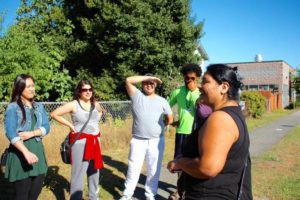By Joyce Yee, LEV Community Organizer
 Seneca Family of Agencies began thirty years ago as a small residential treatment program for some of the most vulnerable foster youth in California. Now, Seneca works with over seventy school districts and charter public schools throughout California and Washington. Their model follows a team-oriented approach that helps build everyone’s capacity for an inclusive school environment to better serve students with trauma histories, mental health needs, disabilities or other barriers to success.
Seneca Family of Agencies began thirty years ago as a small residential treatment program for some of the most vulnerable foster youth in California. Now, Seneca works with over seventy school districts and charter public schools throughout California and Washington. Their model follows a team-oriented approach that helps build everyone’s capacity for an inclusive school environment to better serve students with trauma histories, mental health needs, disabilities or other barriers to success.
The philosophy of Seneca’s work comes from their experiences within and across public systems of care and in working with communities. They believe that the answers to even our communities’ most profound challenges can be found within individuals, and that parents are the primary experts on what works well for their children. And, they believe that designing schools that work for students who have historically struggled the most will result in schools that work for all students.
Lihi Rosenthal, Executive Director of Education at Seneca Family of Agencies, spoke about why some of these common sense strategies have not been widely implemented. “Because of how their funding streams are allocated, both Medicaid-funded mental health services for young people in need and special education services for children with disabilities follow a ‘fail first’ approach,” says Lihi. In other words, students have to struggle mightily after experiencing some sort of trauma before they can receive treatment and services to help them do better.
Once students’ difficulties rise to the level of crisis, then and only then are they cleared to receive expert help from qualified mental health specialists, special educators, and other transdisciplinary professionals. Yet, here again, treatment or services are reserved only for those who have already qualified for help, and are not made available to the school as a whole, even though there may be many other students who could benefit from them. According to Lihi, “The system tends to focus on the few students in crisis, rather than more holistically looking at delivering programs that might benefit all students.” As a result, families of students who struggle the most are often sent to multiple agencies located miles away from the school, decreasing the likelihood that individual interventions will carry over from closed-door therapy rooms into other domains of a young person’s life, from the classroom to the family dining room to the soccer field and the cafeteria.
In contrast, Seneca partners with schools to design interventions that are delivered not through isolated services, but which are integrated with a school culture of safety, belonging and academic curiosity. Wendy Durst, Director of Strategic Partnerships at Seneca Family of Agencies, says, “Seneca works with schools to design preventative and early intervention strategies that bring transdisciplinary experts out of their siloes and into the places where students spend the most time in schools – the hallways, lunch rooms, and their general education classrooms.”
This approach – Seneca’s Unconditional Education model – is currently being studied by SRI International, an external evaluator assigned to the program as part of a federal Investing in Innovation (i3) grant Seneca was awarded in 2013. After its first full year of investigation, the model has shown promising early results at the seven California schools included in the study, including statistically significant gains in literacy and math for students with disabilities and English Language Learners.
Shouldn’t this be part of basic education?
#Beyond Basic
Read LEV’s blog post on Student Supports, an Integral Component of Basic Education
One comment on “Helping Children and Families Succeed Through the Most Difficult Times of Their Lives”
Dear Arik Korman,
Information given by your blog seems very nice and helpful. We are glad to inform you about the high school scholarship program named as, “The Washington State Governors’ Scholarship for Foster Youth” which is available for the high school senior who are planning to graduate from high school during the academic year.
Scholarship Deadline: February 28, 2017
Applicants can get more information about the scholarship through the given link: http://usascholarships.com/washington-state-governors-scholarship-foster-youth/
If you want to get information about various “online courses”, then just click on the given link: http://usascholarships.com/category/free-online-courses/